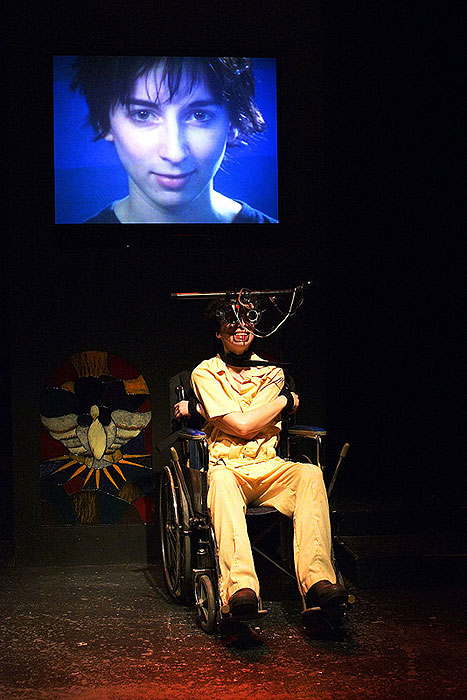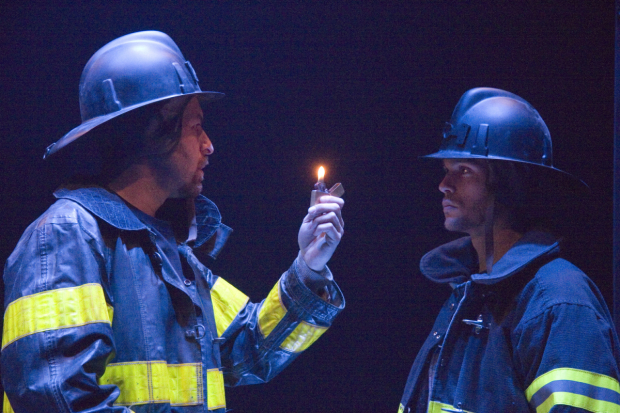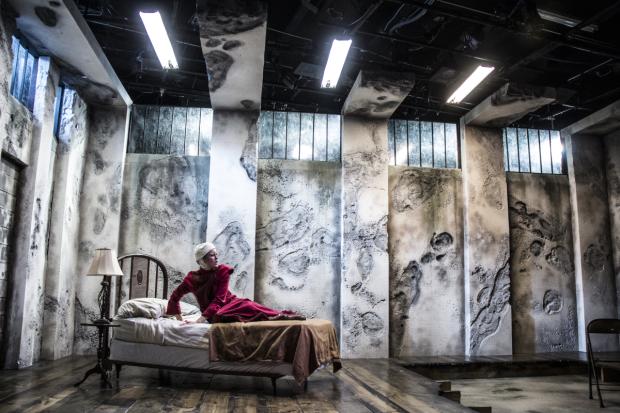5 Dystopian Novels Adapted for the Stage
The Broadway production of ”1984” is preceded by a one-woman ”Handmaid’s Tale” and a ”Brave New World” musical.
1984 is one of those rare books that seem to become more relevant with time. George Orwell's 1949 novel, set in a future where people live under a totalitarian government with little regard for truth, hit the top of Amazon's best-seller list earlier this year. Its rise followed presidential adviser Kellyanne Conway's January 22 characterization of incorrect information given out by the White House as "alternative facts." Now another sign of 1984's relevance is here, this one literal: the Broadway marquee advertising the book's stage adaptation. The production, which opens tonight, may be the first adaptation of a dystopian novel to reach Broadway, but it's hardly the first attempt to stage one. Here are some standouts in the history of dystopian fiction onstage.
For tickets to 1984 on Broadway, click here.
1. A Clockwork Orange

(© Peter Zuehlke)
This novel by Anthony Burgess was published in 1962, though its fame endures largely because of Stanley Kubrick's 1971 film adaptation. It tells the story of 15-year-old Alex and his gang of "droogs," who speak in Nadsat, a teenage slang Burgess invented. They amuse themselves with acts of "ultraviolence," including mugging and gang rape. On one of their sprees, Alex is caught and imprisoned. The government puts him through a reconditioning program during which he's injected with an emetic and forced to watch violent movies.
Burgess himself adapted A Clockwork Orange for the stage in 1987. In 1990, it was performed by the Royal Shakespeare Company with a score by Bono and The Edge. Burgess, who had written his own music for the play, derided the substitution as "neo-wallpaper." Four years later at Chicago's Steppenwolf Theatre, Terry Kinney (The Price) directed the first American production using Burgess's script; the show received mixed reviews. A 2003 multimedia adaptation by Los Angeles-based Ark Theatre Company fared better. That production received several L.A. Weekly Theater Award nominations, and V.C. Smith won for her (yes, her) performance as Alex.
2. Fahrenheit 451

(© Simon Alexander)
Ray Bradbury's 1953 novel is about a fireman of the future whose job isn't to put out fires but to start them. Specifically, he sets fire to books, which have been outlawed. The moratorium on reading started not with the government but with the masses, who abandoned literature for TV, radio, and three-dimensional sex magazines. A few covert bibliophiles remain, however, and one of them is the fireman’s neighbor. She tells him about a past when literature wasn't forbidden and people didn't live in fear of the state. Her words spark doubts in him, making him question his work and the assumptions guiding his life.
Like Burgess, Bradbury wrote a play based on his dystopian novel. Its most high-profile production was an off-Broadway staging by the Godlight Theatre Company in 2006 that featured Teal Wicks (later Elphaba in Wicked) as the fireman's neighbor and lighting by Maruti Evans, now the set designer of Kill Move Paradise. The critical success of the show likely contributed to Godlight winning a Special Drama Desk Award in 2010 for its "consistent originality and excellence in dramatizing modern literature."
3. The Handmaid's Tale

(© Dan R. Winters Photography, Know Theatre, 2015)
The titular handmaid in Margaret Atwood's 1985 novel is Offred, a woman who lives in the Republic of Gilead. Gilead used to be the United States, but as increasing pollution caused more and more Americans to become sterile, a new political order emerged. A totalitarian theocracy deriving its laws from the Bible replaced democracy and addressed the sterility problem by turning fertile women into a class of sex slaves. Euphemistically known as handmaids, they're assigned to bear the children of elite married men whose wives are unable to give birth.
Unlike A Clockwork Orange and Fahrenheit 451, The Handmaid's Tale has had few stage productions. One of them took place two years ago at Cincinnati's Know Theatre. A one-woman show, it stayed true to the novel by letting Offred narrate her story. While some critics praised the script's faithfulness, the Cincinnati Enquirer complained that all the narrative text sometimes made the play seem like a staged reading. Now that the book has been reborn as a popular Hulu series, theater adaptations of it will likely multiply.
4. 1984
Published in 1949, George Orwell's 1984 is set in the year of its title. Its characters live in a London that is no longer part of England but a nation called Oceania, governed by a totalitarian regime known as the Party. Led by the enigmatic Big Brother, the Party monitors its citizens through surveillance cameras. It also manipulates reality by propagating Newspeak, a language created to stifle dissent by omitting objectionable words. The Party's slogans summarize its outlook: "War is peace. Freedom is slavery. Ignorance is strength."
The stage adaptation of 1984 premiered at Nottingham Playhouse in September 2013, three months after the Guardian reported that the U.S. government was keeping records of its citizens' phone calls. From Nottingham, the production transferred to London's Almeida Theatre, then to the West End. Before coming to New York City, the show also made stops in Santa Monica, California; Cambridge, Massachusetts; and, most appropriately, Washington, D.C.
5. Brave New World
Published in 1932 and set in 2540, Aldous Huxley's novel depicts a world dominated by pleasure. There's only one country, known as the World State, and its inhabitants pass the time by having sex and taking soma, a hallucinogenic drug. The government encourages this behavior as a way of keeping citizens under control. To the same end, it genetically engineers them. Humans are grown in hatcheries, where embryos are modified to fit their assigned social class. A high-level hatchery employee, unhappy in this world of regulated gratification, visits a reservation populated by "savages" who engage in such backward practices as monogamy. He takes one home with him, whereupon worlds — or world states — collide.
Huxley's critique of hedonism and materialism has been dramatized at least twice in the past two years. First there was the adaptation by playwright Dawn King that toured the United Kingdom in 2015. It featured a score written by, ironically, These New Puritans. Then the novel was adapted as a full-on musical by Grammy and Emmy Award winner John McDaniel and Jonnie Rockwell (music), Tony Award nominee Bill Russell (lyrics), and Ben Andron (book). Their show premiered last year at the North Carolina Stage Company and received a developmental reading in New York City with Tony winner Beth Leavel (Bandstand) and Tony nominee Will Swenson (who recently appeared in Waitress). Given the big names involved and the number of books-turned-musicals on Broadway, Brave New World is the most likely candidate on this list to follow in 1984's goosesteps.









